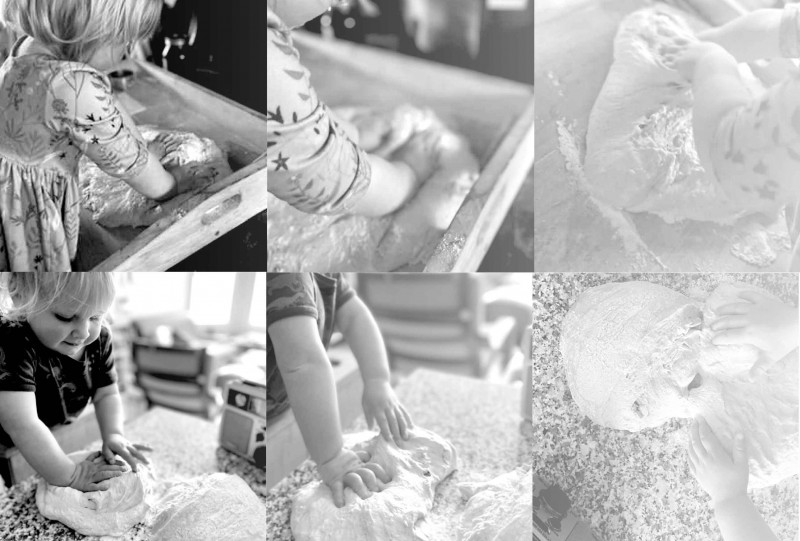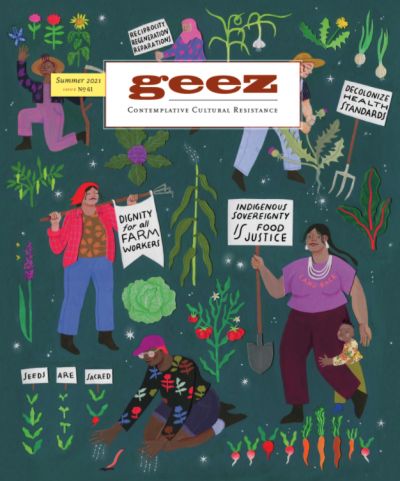Sisters of the Same Seed

Image credit: Kris’ daughter Flora, 3 (top), and Em’s daughter Lorena, 2.5 (bottom) kneed dough from the same family sourdough starter 1,400 kilometres apart, Em and Kris Jacoby, April 2021, Castleton, Vermont and Chicago, Illinois.
I am repeatedly called back, like a ministry, to the growing, tending, gathering, transforming, and sharing of food.
The audio is a transcript of the written piece recorded by Em Jacoby for Geez Out Loud.
The seed was planted during one of my teenage summers spent living on my sister’s small homestead in rural Vermont. I heard my sister say: Why not centre your life around something that is essential for it? I looked down at the dough I was kneading as I heard the coos of my infant nephew.
Two decades later, though Kris remains on that rural homestead and I live in a dense urban neighbourhood 1,400 kilometres (880 miles) away, we share a calling to food as though we share a kitchen. I can still taste that dough we were kneading, rich with ricotta and basil. Only now, my ricotta comes from boiling cast-off gallons of food-bank-donated milk from a Nicaraguan neighbour; Kris’ comes from Tulip, the brown cow born and raised in view of the kitchen window, milked a few hours earlier. While my basil grows in hand-built boxes that hang over my porch railing two stories up, Kris’ comes from the rows of vibrant green herbs in her fields ready to cut for farmers markets.
I easily spend 40 hours a week in my kitchen. I find my vocation in the grinding of grains mounding into a peak in the shiny metal bowl beneath, the dripping of whey from fermenting cream cheese, the snap of a sealed jar of canned tomato sauce speckled with basil and peppercorn. Because of my sister’s words – their grounding in sustainability and history – I am repeatedly called back, like a ministry, to the growing, tending, gathering, transforming, and sharing of food. Even sitting here to write these words, my mind wanders to the seedlings sprouting up from dirt-packed milk cartons resting on my bathroom tiles, and to the pumpkin roasted last fall now thawing to bake into spice bread as edible gratitude for a neighbour.
Across fields and forests, my sister is filling flats with dirt and planting seeds such as Jericho Lettuce, Athena Muskmelon, and Afina Cutting Celery to sprout in her high tunnel (an unheated greenhouse) as the wood-fired evaporator boils down maple sap to sweeten the breakfast tables of many of our loved ones and beyond. Her homestead provides raw milk, eggs from chickens feeding on bugs and non-genetically modified grain, pasture-raised beef, organic sourdough, and pesticide-free abundant produce for dozens of local families – interdependent relationships that have grown as her endeavours in farming have grown.
Our children, eager and curious, are partners in our vocation. My niece could crawl down rows of onions in the fields to pull weeds before she could walk. My youngest could scoot down rows in the community garden, plucking tomatoes on which to teethe. Both of these young beings knead sourdough from the same starter and expect it as toast in the morning. Both of these young beings can be found scooping sesame sticks from the bulk bins of the food cooperative. Both of these young beings bring us closer to our great grandmother Lorena. They are growing up with physical work for sustenance, unbranded glass jars of local food, unboxed baked goods, dirt-filled sinks and socks, and snacks from a nearby tree with neighbours in the cycle of it all.
Em Jacoby lives in Chicago, Illinois and prefers her beets pickled. Usually parenting her young kids, she was able to play around with these words thanks to her partner, Brian.



Start the Discussion